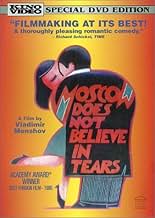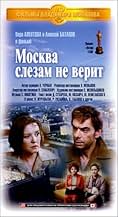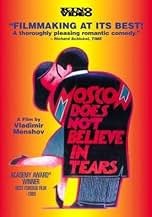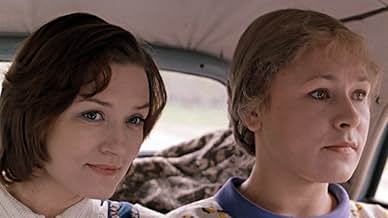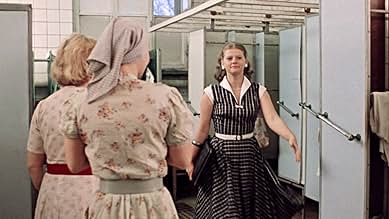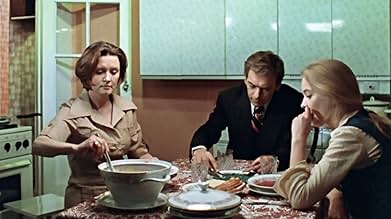IMDb-BEWERTUNG
8,0/10
15.238
IHRE BEWERTUNG
Drei junge Frauen aus der Provinz kommen nach Moskau auf der Suche nach dem, wonach die Menschen in allen Hauptstädten der Welt suchen - Liebe, Glück und Wohlstand.Drei junge Frauen aus der Provinz kommen nach Moskau auf der Suche nach dem, wonach die Menschen in allen Hauptstädten der Welt suchen - Liebe, Glück und Wohlstand.Drei junge Frauen aus der Provinz kommen nach Moskau auf der Suche nach dem, wonach die Menschen in allen Hauptstädten der Welt suchen - Liebe, Glück und Wohlstand.
- Regie
- Drehbuch
- Hauptbesetzung
- 1 Oscar gewonnen
- 3 Gewinne & 1 Nominierung insgesamt
Vladlen Paulus
- Pyotr Lednev
- (as V. Paulus)
Empfohlene Bewertungen
Vladimir Menshov's well-balanced 'Moscow does not believe in tears' provides a moving story about human warmth. About fortunes and misfortunes that can befell anyone of us -- enabling us to identify easily.
This film also is about a very East European female eagerness to hunt after Mr. Right. Pressure is on, for in Communist society failure usually meant a lifelong condemnation to a poor, worried, boring and tiring life in some drab Russian provincial town. With a big possibility that your husband would booze himself up too much.
No doubt this film's acting makes its strongest feature. Its uninterrupted, breathtaking quality convincingly carries you back some fifty years in time. To Moscow, the capital of the USSR. Although this Communist society has been gone for a long time, 'Moscow does not believe in tears' will easily get you back there.
This film also is about a very East European female eagerness to hunt after Mr. Right. Pressure is on, for in Communist society failure usually meant a lifelong condemnation to a poor, worried, boring and tiring life in some drab Russian provincial town. With a big possibility that your husband would booze himself up too much.
No doubt this film's acting makes its strongest feature. Its uninterrupted, breathtaking quality convincingly carries you back some fifty years in time. To Moscow, the capital of the USSR. Although this Communist society has been gone for a long time, 'Moscow does not believe in tears' will easily get you back there.
Moscow Does Not Believe In Tears is an appealing comedy-drama with much to say about Soviet society from the 1950s to the 1970s. The cast deliver standout performances, and this is the film's greatest strength. The story is about their lives. The city's scenery is often featured, with cinematography that's good for a Soviet drama film. The score, however, is standard fare, but there are a few notable songs. Considering its high entertainment value it's no wonder that Moscow Does Not Believe In Tears became one of the most popular films in the Soviet Union. It even won an Academy Award for Best Foreign Language Film in 1980. It's just one of those films where everyone involved in making it contributed to a result that delivers on all fronts. If the acting or the direction was worse then the result could have been another forgettable drama. Soviet filmmakers, however, specialized in drama films. This is because of the restrictions that were put on them by the government. Many good dramas were released during the Soviet period, and Moscow Does Not Believe In Tears is one of the most memorable. I definitely recommend seeing it.
This film makes one wonder what exactly the heroine worked so hard for. A young girl from a small town comes to Moscow and becomes pregnant. Her lover repudiates her, the lover's mother humiliates her, telling her that she is not a good fit for her big-city dandy son. Rather than leave Moscow and go back to her parents, or try to perform an abortion on herself, the heroine has the baby. She works hard at the factory, getting up at 5 AM every morning, passes grueling entrance exams into college, becomes an engineer -- all while raising her little girl as a single parent and an unwed mother. Bold subject matter for a Soviet movie made in the seventies.
Then -- a compromise: the heroine who, sixteen years after her ordeal, has a good life, a good home, and a prestigious managerial job, falls head over heals for a man who treats her like dirt.
"Moscow Does Not Believe in Tears" was made almost at the same time as the equally celebrated "Workplace Romance" ("Sluzhebnyj Roman"), and they are, in a sense, competitors. Both movies are about single women in their mid- to late thirties who made a brilliant career but were never married. Both heroines are presented as strong-willed, independent individuals in managerial positions, whose lives are nevertheless missing something. But if "Sluzhebnyj Roman" says that life is incomplete without love, "Moscow Does Not Believe in Tears" says that life is incomplete without a man.
Women of the older generation are all in love with "Moscow"'s main male character -- the heroine's ultimate husband. I cannot fathom why -- the actor's cute, but his character is unnerving. One does not need to be a feminist to have a strong urge to throw this man down the stairs. He stifles every impulse of individuality in her; he presumes to know what she wants, what's proper for her and what's not; he patronizes her; he pushes her around. On the train, he begins their acquaintance by commenting: "You have the eyes of a woman who is not married." (What kind of eyes are those?) I cannot see why one would find any charm in such familiarity and cocky self-assurance from a stranger.
It's worth noting that the corresponding character in "Sluzhenyj Roman" -- an excessively mild-mannered, shy man -- learns to stand up to the bossy heroine, but does so without disrespecting her. The character in "Moscow", on the contrary, puts the heroine in her proper place -- which is to be quiet and follow orders.
I think that a Western critic would perceive the ending of "Moscow Does Not Believe in Tears" as ironic and sad. The heroine, a woman who spent her life making something of herself by overcoming seemingly insurmountable obstacles, is last shown fussing around her kitchen for the benefit of a man who was not with her on that long journey, who dares to raise his voice at her in her own home, while eating her food, and who acts as if his very physical presence at the table confers a rare privilege on a woman whose clock is ticking.
Then -- a compromise: the heroine who, sixteen years after her ordeal, has a good life, a good home, and a prestigious managerial job, falls head over heals for a man who treats her like dirt.
"Moscow Does Not Believe in Tears" was made almost at the same time as the equally celebrated "Workplace Romance" ("Sluzhebnyj Roman"), and they are, in a sense, competitors. Both movies are about single women in their mid- to late thirties who made a brilliant career but were never married. Both heroines are presented as strong-willed, independent individuals in managerial positions, whose lives are nevertheless missing something. But if "Sluzhebnyj Roman" says that life is incomplete without love, "Moscow Does Not Believe in Tears" says that life is incomplete without a man.
Women of the older generation are all in love with "Moscow"'s main male character -- the heroine's ultimate husband. I cannot fathom why -- the actor's cute, but his character is unnerving. One does not need to be a feminist to have a strong urge to throw this man down the stairs. He stifles every impulse of individuality in her; he presumes to know what she wants, what's proper for her and what's not; he patronizes her; he pushes her around. On the train, he begins their acquaintance by commenting: "You have the eyes of a woman who is not married." (What kind of eyes are those?) I cannot see why one would find any charm in such familiarity and cocky self-assurance from a stranger.
It's worth noting that the corresponding character in "Sluzhenyj Roman" -- an excessively mild-mannered, shy man -- learns to stand up to the bossy heroine, but does so without disrespecting her. The character in "Moscow", on the contrary, puts the heroine in her proper place -- which is to be quiet and follow orders.
I think that a Western critic would perceive the ending of "Moscow Does Not Believe in Tears" as ironic and sad. The heroine, a woman who spent her life making something of herself by overcoming seemingly insurmountable obstacles, is last shown fussing around her kitchen for the benefit of a man who was not with her on that long journey, who dares to raise his voice at her in her own home, while eating her food, and who acts as if his very physical presence at the table confers a rare privilege on a woman whose clock is ticking.
This is a tribute to the Soviet era some people in Ukraine still consider to be the best years of their lives.I saw the movie in my child years, but didn't pay much attention to it. Now, when I study film history and techniques, the movie revealed to me some dark sides. "Moskva sliezam nie verit", I guess, tells a story of a humble Soviet woman in pursuit for happiness with a beloved man. This woman does not care about feminism. True love of a man-"stronghold", a man who is ready to comfort her any time she needs--that is what she is searching for in life. The movie shows some cloudy moments in the way to happiness three female friends go along. And the movie ends up where it should--an "island of placid" I watch it in original. Have to say, many phrases from the movie are cited in Ukrainian and Russian-speaking communities these days.
Moving story of three young girls who come to the capital of Soviet Russia in search of their fate. They play rich girls to impress the guys, and succeed in doing so. Katya (the protagonist) does not like the game, but still goes with the girls. But the truth is soon revealed, and Katya's boyfriend breaks up with her. She is pregnant and has to raise a kid alone in a tiny dorm room, and still try to get an education.
The second part shows the three girlfriends 20 years later. Katya is a very successful business lady and has a wonderful daughter. But she hasn't found real love, and the story takes a new turn when she meets Gosha in a train. They both now have to find ways into each other's established lives. A very nice and sincere story that people watch over and over again!
The second part shows the three girlfriends 20 years later. Katya is a very successful business lady and has a wonderful daughter. But she hasn't found real love, and the story takes a new turn when she meets Gosha in a train. They both now have to find ways into each other's established lives. A very nice and sincere story that people watch over and over again!
Wusstest du schon
- WissenswertesOne of four Russian films ever to win Academy Award for Best Foreign Language Film. The other are Krieg und Frieden (1965), Uzala, der Kirgise (1975) and Die Sonne, die uns täuscht (1994).
- PatzerWhen Lyudmila and her friend approach the office building she is wearing a pair of white shoes. Once inside the building the shoes color changes to black.
- Zitate
Lyudmila Gurina: Don't cry.
Lyudmila Gurina: You know what Moscow thinks of tears.
Lyudmila Gurina: We shouldn't be sitting around, we should do something.
- VerbindungenFeatured in Der Kurschatten (1985)
- SoundtracksAleksandra, Aleksandra
Written by Sergey Nikitin and Dmitry Suharev and Yuri Vizbor
Performed by Tatyana Nikitina and Sergey Nikitin
Top-Auswahl
Melde dich zum Bewerten an und greife auf die Watchlist für personalisierte Empfehlungen zu.
- How long is Moscow Does Not Believe in Tears?Powered by Alexa
Details
- Erscheinungsdatum
- Herkunftsland
- Offizieller Standort
- Sprache
- Auch bekannt als
- Moscow Does Not Believe in Tears
- Drehorte
- Produktionsfirmen
- Weitere beteiligte Unternehmen bei IMDbPro anzeigen
Box Office
- Budget
- 900.000 $ (geschätzt)
- Weltweiter Bruttoertrag
- 217 $
- Laufzeit
- 2 Std. 30 Min.(150 min)
- Seitenverhältnis
- 1.37 : 1
Zu dieser Seite beitragen
Bearbeitung vorschlagen oder fehlenden Inhalt hinzufügen


